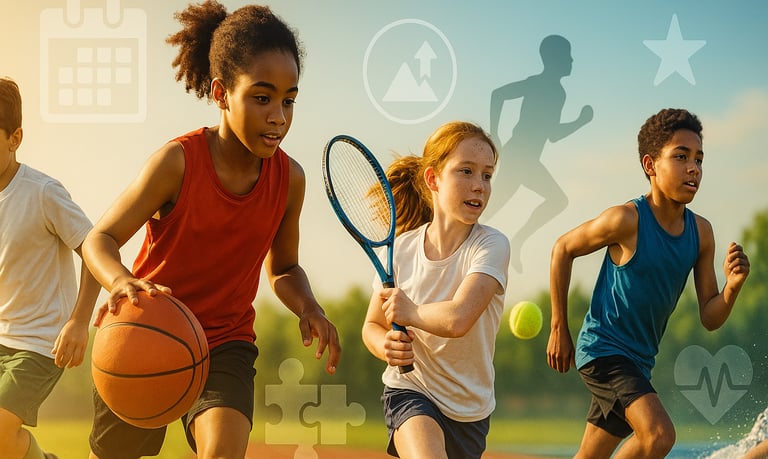Should Kids Play Sports? 5 Life Lessons They’ll Learn
BLOGS


Should kids play sports? Absolutely—because youth sports, when guided with care, teach children valuable life lessons that stick well beyond the playing field. Through fun and safe participation, kids build discipline, teamwork, resilience, leadership, and healthy habits. Sports help boost confidence, social skills, and well-being for every child—win or lose—preparing them for life’s challenges and successes.
Should Kids Play Sports? 5 Life Lessons They’ll Learn
Short answer: Yes—when sports are guided with care, they teach kids powerful life lessons that last long after the final whistle. Let’s break it down in simple language and show why youth sports matter.
Why Sports Matter Early
Kids today face screens, pressure, and sometimes low confidence. A well‑run sport (soccer, basketball, baseball, volleyball, swimming, tennis, track, gymnastics—any safe physical activity) gives structure, healthy movement, social skill practice, and a sense of belonging. A team can feel like a second family. Even individual sports teach self‑control and goal setting. That’s why parents, coaches, and schools keep asking: “Are sports worth the time?” The answer is yes—if we focus on learning, safety, fun, character, and balanced routines.
We’ll look at five big life lessons: Discipline & Habits, Teamwork & Communication, Resilience & Growth Mindset, Leadership & Character, Health & Well‑Being.
1. Discipline & Habits
Daily practice builds self-discipline, time management, and goal setting. A kid learns to pack gear the night before, eat a balanced snack, finish homework, then head to practice. Showing up on time becomes normal. Repeating a drill (like free throws or serving a tennis ball) trains the brain to love small improvements. This creates a growth habit loop: set a target → practice → get feedback → adjust → improve → feel motivated → repeat.
Life lesson: Success usually comes from steady routines, not random bursts. That carries into studying, music, and future jobs.
Parent/coach tip: Celebrate consistency (“You practiced 4 days this week!”) more than only winning. That tells kids the process matters.
2. Teamwork & Communication
On a field or court, kids discover that talent alone is not enough. They must communicate, listen, share the ball, rotate positions, and trust others. A shy child may learn to call “Mine!” or “Switch!” The loud kid learns to pause and hear a teammate’s idea. They practice empathy, noticing when someone looks frustrated and offering support.
They also meet diversity: different backgrounds, strengths, and temperaments. Learning to adjust builds social intelligence. Kids practice solving small conflicts (“Who plays goalie first?”) and learn sportsmanship—shaking hands, saying “Good game,” respecting referees.
Life lesson: Working well with others multiplies everyone’s success and feels better than going alone.
Parent/coach tip: After games ask, “How did the team help each other today?” instead of only “Did you score?”
3. Resilience & Growth Mindset
Sports bring failure, losses, mistakes, and sometimes bench time. This is good (in healthy doses). Missing a shot teaches emotional regulation: breathe, reset, try again. Losing a close game builds grit and perseverance. Injuries (minor sprains, not dangerous ones) teach patience and careful rehab. Setbacks give a live lab for growth mindset (“I can’t do this yet”) instead of fixed mindset (“I’m just bad”).
Kids learn to break big goals into smaller steps: improve footwork, build endurance, strengthen core muscles, track personal bests (lap time, throws completed, shots on target). They see progress is not always a straight line. That mental toughness later helps with tough exams, college admissions, and career challenges.
Life lesson: Failure is feedback, not a dead end.
Parent/coach tip: Model calm: “What did you learn from that miss?” not “Why did you miss?” Praise effort adjustments (“You kept your head up after the turnover.”).
4. Leadership & Character
Leadership is not only the captain wearing an armband. Any child can show initiative: organizing warm‑ups, encouraging a teammate, owning a mistake (“That was my mark—I’ll fix it”). Sports reveal integrity: choosing honesty (calling your own foul) even if the ref misses it. Kids practice decision making under mild pressure (pass or shoot, sprint or hold back). They also learn responsibility: keeping equipment clean, staying hydrated, sleeping enough before tournaments.
Good programs teach respect, inclusion, and anti-bullying norms. When a stronger player supports a beginner, both grow. Serving others—filling water bottles, cheering from the bench—builds a service mindset.
Life lesson: Real leadership is service, encouragement, and doing the right thing when nobody watches.
Parent/coach tip: Rotate small leadership roles (lead stretches, track stats) so every child tastes responsibility.
5. Health & Well‑Being
Regular movement boosts cardiovascular fitness, coordination, motor skills, balance, and strength. It supports a healthy body weight, better posture, and improved sleep quality. Physical activity releases mood‑lifting chemicals that help reduce stress and mild anxiety. Kids also learn basic nutrition: water over sugary drinks, fueling with complex carbs and protein, not skipping meals.
Playing sports can build self-confidence. Skills mastered through practice—like a clean dive, a strong layup, a smooth baton handoff—give kids a sense of competence. Confidence blends with emotional health: they learn to handle adrenaline, calm nerves, and focus.
Important: Balance matters. Too much pressure, overtraining, or ignoring rest can lead to burnout or repetitive injury. Healthy coaching respects rest days, cross-training, proper warm-ups, and cool-downs.
Life lesson: Caring for your body and mind is a long-term project, not a quick fix.
Parent/coach tip: Track signs of fatigue (constant soreness, irritability). Encourage downtime, hydration, stretching, and fun free play.
Keeping Perspective
Not every child will earn a scholarship or go pro—and that’s okay. The transferable skills are the true win: consistency, cooperation, resilience, leadership, and healthy living. Supportive adults should keep fun first, watch for unsafe coaching, and avoid tying love or approval to performance. Ask kids what they enjoy. Let them try multiple sports to prevent overuse injuries and increase overall athletic IQ.
Quick Safety & Balance Checklist
Medical clearance for intense programs
Proper protective gear (helmet, mouthguard, pads when needed)
Age‑appropriate training load
Emphasis on technique over early heavy specialization
Clear hydration plan
Respect for rest & recovery
Positive, skill-focused feedback
Zero tolerance for bullying or unsafe drills
Final Takeaway
Yes—kids should play sports when the environment is healthy. The scoreboard fades, but disciplined habits, teamwork, resilience, leadership, and a wellness mindset travel with them into high school, college, work, and family life. Support them, keep perspective, and let the game help shape strong, kind, capable humans.
